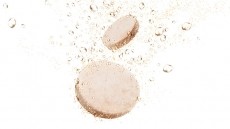Gelita protein promises to cut fat in chocolate
been developed to partially replace the fat in chocolate.
The innovation won Gelita the silver medal for the Most innovative Food Ingredient at the recent FI South America trade show in Sao Paulo, Brazil.
Gelita claims that its Instant Gel Schoko ingredient can replace up to a quarter of the fat without affecting the product's sensory and physical characteristics.
"The key challenge for all ingredients suitable for fat reduction is to keep the sensory and physical characteristics of milk chocolate the end consumers are used to," said the Germany-based company in a statement.
Instant Gel Schoko was developed specifically for the South American market by Gelita experts in Cotia, Brazil. The protein has been designed to partly replace the cocoa butter in milk chocolate.
The launch underlines the growing importance among food makers of developing low-fat alternatives that are still capable of appealing to consumer tastes.
"Instant Gel Schoko is able to replace cocoa butter up to 39 per cent resulting in 25 per cent lower overall fat content in the chocolate,"said the firm. "Furthermore saturated fat is reduced by 28 per cent, cholesterol by 15 per cent and calories by 8 per cent whilst the protein content is increased by 75 per cent."
Beside all these additional benefits, Gelita claimed that original chocolate properties such as colour, crystallisation and melting point of the cocoa butter are maintained. In addition, it said recipe modifications could be integrated into the regular existing production process very easily.
"Instant Gel Schoko, as a pioneering innovation for chocolate has already generated high interest at leading companies of the chocolate industry," said Claudia Yamana, vice president of marketing/sales for Gelita South America.
"This is not surprising as world chocolate production is 3.5 million metric tons and the mega-trend of fat reduction is one of the global goals of the WHO."
Chocolate is big business. According to Leatherhead, the top six confectionery firms including large producers such as Nestle, Mars and Cadbury Schweppes own 65 per cent of the global chocolate market. Trade journal, Candy Industry, places Mars as the leading supplier in 2004 to 2005 with confectionery sales of €7.43bn. Nestle takes second place with €6.89bn, closely followed by Cadbury Schweppes with €6.68bn.
However, Leatherhead claim that, due to recent acquisitions, Cadbury is now the number one confectionery firm in terms of market share with 10 per cent of the global industry.











